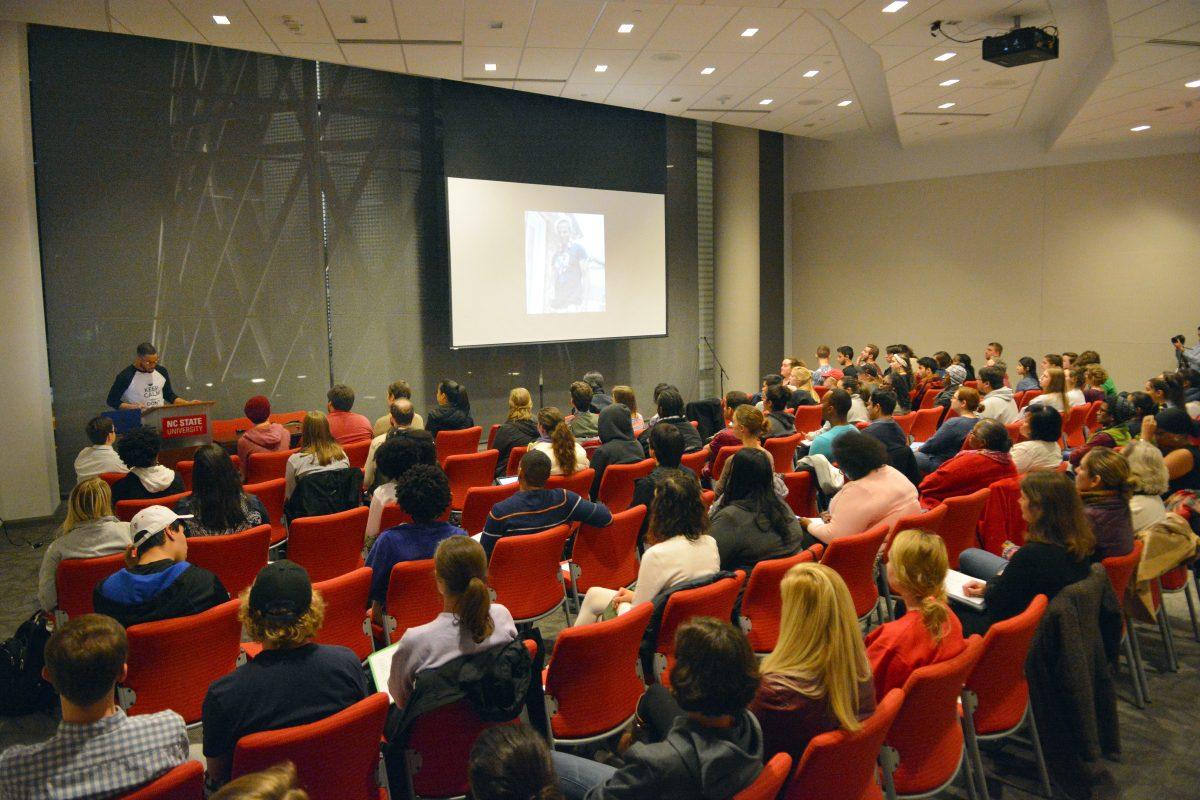Ravi Perry, an activist and scholar from Virginia Commonwealth University, addressed the violence in underrepresented communities that underlines the #BlackLivesMatter and #TransLivesMatter movements in a lecture titled “Rise. Resist. Repeat.” Wednesday evening during the second annual Social Justice January.
Black Lives Matter is “an ideological and political intervention in a world where black lives are systematically and intentionally targeted for demise. It is an affirmation of black folks’ contributions to this society, our humanity and our resilience in the face of deadly oppression,” according to Perry.
The movement was started by “three queer black women” in response to the acquittal of George Zimmerman for the death of Trayvon Martin in 2013.
“We are inherently talking about the matter of life,” Perry said.
He argued the oppression of blacks, transgender people and other minority groups exists today, along with police brutality that has been present in United States for hundreds of years.
“Just ask Jamar Clark of Minneapolis. Oh, that’s right. You can’t, because Jamar is dead. Jamar and countless others are dead,” Perry said. “Dead, as in killed by people in authoritative positions. Killed by people sworn to protect and to serve. Killed by people lauded regularly with parades and pensions and ceremonies for their bravery and commitment to justice.”
Perry also addressed the #TransLivesMatter movement and the violence surrounding it. Almost 6.5 percent of transgender people are black and female with about 45,000 black transgender women in the U.S.
The Black Lives Matter movement also serves as a feminist critique of violence against blacks. The founders felt that the only violence recognized was that against heteronormative, cisgender men and anyone that did not fit this criteria would not receive adequate attention.
“We know Trayvon, we know Tamir, we know Eric, we know Michael … we don’t know the names of Islan Nettles, or Renisha McBride all of these people that were unfairly targeted or demised,” Perry said.
Perry said that it’s not about ridding the police force of a few bad apples. It’s about those few bad apples being entrenched in a system that is designed to protect them first and give lip service to citizens second.
According to Perry, we are experiencing the rollback of the upward mobility of “queer” and black people while we have a black president in office.
Perry said the president is not offering viable solutions in regards to violence against marginalized groups, and one man cannot single handedly fix the politics of the country.
Perry then went on to challenge the audience to collectively rise, resist and repeat.
“I simply want to have some reason to rise,” Perry said. “I want to be helped with the righteousness to resist and I would hope that I have some assistance with some resilience to repeat. I call that r-cubed.”
He argued that we must rise like Nikatta Oliver, the walkout organizer at the University of Washington, or Brittany Cooper, an advocate for transgender and gender non-conforming people.
“I found the presentation to be an eye-opening experience that really showed me the challenges in promoting change in the way we deal with race,” said Ryan Levine, a freshman studying fisheries and wildlife science. “It also brought up how important intersectionality is in movements, despite often being ignored.”
Perry holds a doctorate from Brown University in political science, and he is currently an associate professor of political science at Virginia Commonwealth University.
The event was hosted by the GLBT Center, Women’s Center, Multicultural Student Affairs and African American Cultural Center. It was open to faculty, staff, students and community members and had about 100 attendees.








